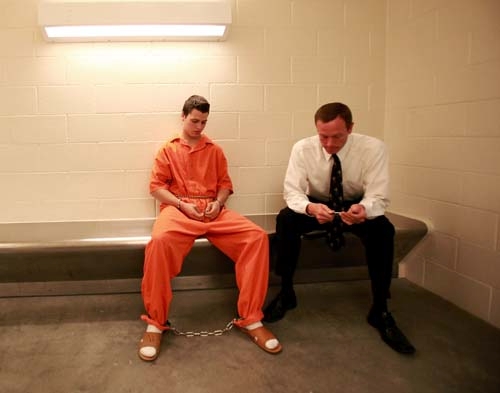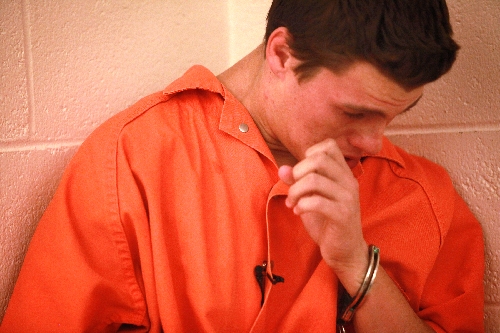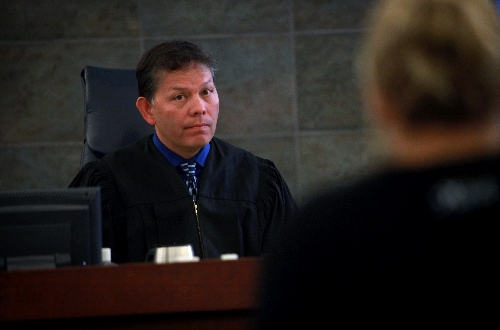Addicts, families hope program survives setbacks
Jack Armstrong fights back tears in a holding cell at the Regional Justice Center before a recent court appearance as he recounts caving in to the pressures of drug use in the midst of his recovery.
His neon orange "INMATE" jumpsuit contrasts with the cell's dreary white walls. Chains around his arms and legs clang on the hard bench as he explains what went wrong.
"I thought I could fight it," said Armstrong, his eyes watering. "I thought my willpower was good enough."
Just six weeks ago, the 20-year-old drug addict spoke proudly to a Review-Journal reporter about his sobriety and success in the Youth Offender Court program.
Judge Cedric Kerns, who created the drug treatment program in April, had taken Armstrong off a tracking device only a few weeks earlier to reward him for his efforts.
He had become a poster child of the program and represented the success of conquering drug addiction.
Armstrong didn't want to face the judge who gave him a second chance at sobriety.
To face the family that believed in him.
To face the friends who supported him.
To face the other offenders who strived for his success.
With success comes failure, which is highlighted by the struggle of YO Court defendants such as Armstrong who work to stay sober.
The valley's drug counseling resources could not stop Armstrong from surrendering again to his addiction to prescription medication. The toughest part was admitting it.
When his drug-using buddy returned to town, Armstrong's 80-plus days of sobriety were gone -- just like that.
Armstrong repeatedly apologizes as the tears roll freely down his face at this realization. The chains around his arms and waist make it difficult to wipe away the tears.
He admits using synthetic urine he bought to pass his drug tests once his ankle bracelet was taken off. He says he knew better. He talks about the power of his addiction.
Armstrong gasps for breath as his body uncontrollably quivers from the sobbing he desperately wants to suppress. After a few minutes, he collects himself and continues.
When the drugs entered his bloodstream, Armstrong said he welcomed his old friend, OxyContin, and that familiar numbing feeling.
"I just wanted to get high," he said, dejectedly. "I couldn't think of anything else."
Just last month, defendant Emily Hoeffner was on thin ice with Kerns. The 19-year-old heroin addict was uncooperative, and the judge wanted to kick her out of the YO Court program. He tossed her in jail at least twice for not completing court mandates.
Hoeffner now is one of the success stories, a far cry from almost being tossed out six weeks ago.
The other offenders pleaded with Kerns to keep Hoeffner in the program. They wanted to help her with sobriety because nothing else had worked. Now, Hoeffner is more than 90 days sober and feeling better about staying clean. Before, she could not stay sober for more than a few hours.
Her addiction was so bad at one point she robbed people at gunpoint to make sure she had her heroin. Hoeffner used drugs so she would not be sick during the day.
"The program is actually making me get back on track with my life," Hoeffner said. "I don't think anybody else could save me, but I think this program will save my life."
She eliminated the enablers in her life and said she is grateful for life in a sober home.
"I've changed a hell of a lot since I came into the program," Hoeffner said. "I'm more motivated, and I'm working on my confidence. I take baby steps. I don't make the big leaps. I can only do this one step at a time."
YO Court is a yearlong drug treatment program in Las Vegas Municipal Court that requires defendants and their families to participate in the recovery process.
Offenders are 18- to 24-year-olds, who are there for other crimes such as petty larceny and failing to pay traffic fines. Instead, they used money for court fines to feed their addictions.
Family participation is a key to the program, even when a defendant stumbles. Connie Graham, Armstrong's mother, said going through the program has helped her learn the skills to cope with her son's addiction.
"If I hadn't gone through this program, I would be a basket case right now," Graham said. "I would get no sleep. I'd be frustrated. I'd be emotional. The program is not just for the addict; it's for the family members. That's what's key. Because things are better for me, Jack's chance of getting better is greater."
Before the program, Graham said she enabled her son's behavior by bailing him out of sticky situations. She has since learned to step back and let her son fend for himself.
Despite her son's slip-up, the program is working for the other 20 or so offenders, she added.
"Even if the ultimate horrible thing happens, where Jack ends up in a gutter somewhere or overdoses, I want the program to go on," Graham said.
"I don't want the program to fail because my child chooses not to work the program. It's an opportunity that otherwise these guys won't have."
Kerns said the successes and failures of the defendants are all a part of the unexpected nature of the new program, which includes incentives such as show tickets for good behavior, at times.
"There is no 'one size fits all,' " Kerns said. "It's all different. There's no formula. We all sit down to figure out what they need and take care of it.
He is working to alter the program to incorporate a three-strike component that punishes offenders who make mistakes in the program by downgrading where they live during their recovery, offering more jail time or moving them into transitional prison housing called Casa Grande, where Armstrong recently was transferred.
"It's a facility you go to from prison when you have time hanging over you, and you're able to fit in with society once your time is done," Kerns said.
Jack Armstrong will be there for 10 weeks and is allowed to contact his family only by letter.
"If Jack's going to get sober, this will be what will do it," Graham said.
YO Court is funded by private donations and state money slated for specialty court programs. Defendants pay off their fines and rent. Their families pay discounted prices for counseling and other rehabilitation resources mandated by the program.
Kerns said his YO Court budget is about $60,000 this year. If the defendants had been jailed, it would have cost taxpayers about $95 per day for them.
"Funding is tough. We make our defendants pay for themselves," Kerns said. "The defendant is working on recovery, pays for housing, and stress is the No. 1 indicator for relapse. We're surviving."
But money is a major source of stress for the defendants, the judge said.
Another measure of success is the way defendants' families are changing how they relate to their loved ones' addictions. Graham, Armstrong's mother, told the judge she thought her son was using again, and "she would never have done that before," Kerns said.
Rob Hunter, a clinical psychologist and addiction specialist with Las Vegas Recovery Center, which works with the new court program, said he is noticing the change in the attitudes of YO Court families.
Hunter offers a family renewal session that teaches defendants' relatives about addiction.
"It's a way in which we encourage them to establish their own support networks. We teach them about brain function and what happens when addicts use. The point is to strengthen family members individually and as a whole. It's rebirth without the addiction."
Hunter said Kerns' approach with his defendants is rare because he involves the families.
"He does more of that hands-on stuff than any other judge I've ever seen in my life," Hunter said. "We need more of those guys here in Las Vegas."
For defendants such as Armstrong, Kerns and the YO Court program represent a path to sobriety that could mean the difference between life and death. Armstrong said he is striving to improve for both himself and his family.
"I hope I'm ready this time," he said. "I hope I don't have another use in me. I hope this is my last time being in chains. I do want to become sober."
Contact Kristi Jourdan at kjourdan@reviewjournal.com or 702-383-0279.
Youth Offender Court program helps young addicts



























